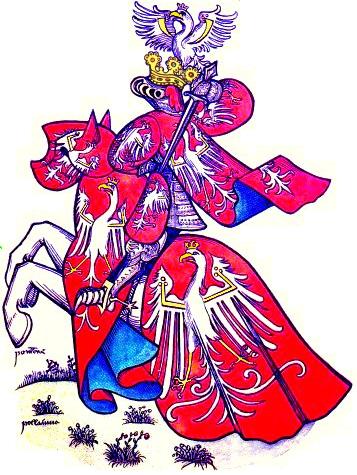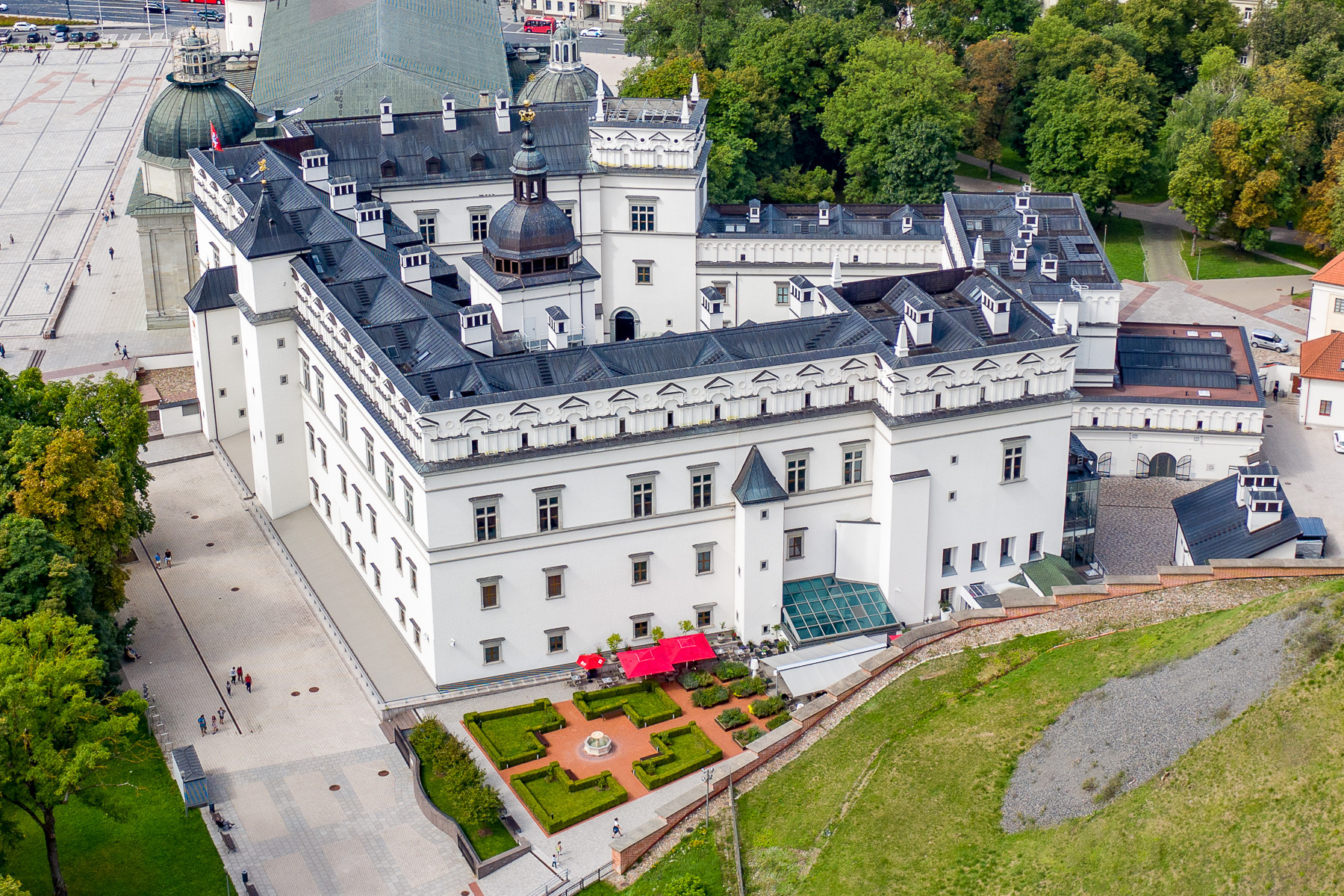|
Poniatowski
The House of Poniatowski (plural: ''Poniatowscy'') is a prominent Polish family that was part of the nobility of Poland. A member of this family, Stanisław Poniatowski, was elected as King of Poland and reigned from 1764 until his abdication in 1795. Since Polish adjectives have different forms for the genders, ''Poniatowska'' is the equivalent name for a female member of this family. History The Poniatowski family became most prominent in the late 18th century and 19th century. In three generations, the family rose from the rank of gentry to that of senator and then to royalty (in an elective monarchy). The first information about the family dates back to the end of the 15th century, when they appeared in Poniatowa, 40 km west from Lublin in about 1446. Their family name derives from that place name. Poniatowa was the residence of several branches of the Poniatowski family: Tłuk, Jarasz and Ciołek. According to the family's history, the family had ties ... [...More Info...] [...Related Items...] OR: [Wikipedia] [Google] [Baidu] |
Stanisław August Poniatowski
Stanisław II August (born Stanisław Antoni Poniatowski; 17 January 1732 – 12 February 1798), known also by his regnal Latin name Stanislaus II Augustus, and as Stanisław August Poniatowski (), was King of Poland and Grand Duke of Lithuania from 1764 to 1795, and the last monarch of the Polish–Lithuanian Commonwealth. Born into wealthy Polish aristocracy, Poniatowski arrived as a diplomat at the Russian imperial court in Saint Petersburg in 1755 at the age of 22 and became intimately involved with the future empress Catherine the Great. With her aid, he was elected King of Poland and Grand Duke of Lithuania by the Sejm in September 1764 following the death of Augustus III. Contrary to expectations, Poniatowski attempted to reform and strengthen the large but ailing Commonwealth. His efforts were met with external opposition from neighbouring Prussia, Russia and Austria, all committed to keeping the Commonwealth weak. From within he was opposed by conservative interests ... [...More Info...] [...Related Items...] OR: [Wikipedia] [Google] [Baidu] |
Stanisław Poniatowski (1676–1762)
Stanisław Poniatowski (15 September 1676 – 29 August 1762) was a Polish military commander, diplomat, and noble. Throughout his career, Poniatowski served in various military offices, and was a general in both the Swedish and Polish–Lithuanian militaries. He also held numerous civil positions, including those of '' podstoli'' of Lithuania and Grand Treasurer of the Lithuanian army in 1722, voivode of the Masovian Voivodeship in 1731, regimentarz of the Crown Army in 1728, and castellan of Kraków in 1752. Throughout his lifetime, he served in many '' starost'' positions. Poniatowski was involved in Commonwealth politics, and was a prominent member of the Familia, a faction led by the Czartoryski family. On a number of occasions he was in service of Stanisław I Leszczyński, the principal rival of Augustus II for the throne of Poland. Having served under Leszczyński as a military officer and envoy during the Great Northern War, Poniatowski later embraced the Russia ... [...More Info...] [...Related Items...] OR: [Wikipedia] [Google] [Baidu] |
King Of Poland
Poland was ruled at various times either by dukes and princes (10th to 14th centuries) or by kings (11th to 18th centuries). During the latter period, a tradition of Royal elections in Poland, free election of monarchs made it a uniquely electable position in Europe (16th to 18th centuries). The first Polish ruler whose existence is not debatable was Mieszko I, Duke Mieszko I, who Christianization of Poland, adopted Christianity under the authority of Rome in the year 966. He was succeeded by his son, Bolesław I the Brave, who greatly expanded the boundaries of the Polish state and ruled as the first king in 1025. The following centuries gave rise to the mighty Piast dynasty, consisting of both kings such as Mieszko II Lambert, Przemysł II or Władysław I the Elbow-high and dukes like Bolesław III Wrymouth. The dynasty's rule over Poland ceased with the death of Casimir III the Great in 1370. In the same year, the Capetian House of Anjou became the ruling house with Louis I t ... [...More Info...] [...Related Items...] OR: [Wikipedia] [Google] [Baidu] |
Ksiaze Jozef
The princely houses of Poland and Lithuania differed from other princely houses in Europe. The Polish and Lithuanian nobility (''szlachta'') could not be granted noble titles by the Polish kings, King in the Polish-Lithuanian Commonwealth as hereditary titles, with some exceptions, were largely forbidden. Therefore, the title of ''prince'' either dated to the times before the Union of Lublin, which created the Commonwealth in 1569, or was granted to some nobles (usually magnates) by foreign kings. Due to the longstanding history of Polish-Lithuanian union, common statehood, some noble families often described as "Polish" actually originated in Grand Duchy of Lithuania and are of Lithuanians, Lithuanian or Ruthenians, Ruthenian descent. Kingdom of Poland Duchy of Pomerania Polish–Lithuanian Commonwealth Old Lithuanian Gediminid and Ruthenian (Rurikid) Princely Houses Princely Houses with Tatars, Tatar origin These princely houses lived like average rich nobility, but ... [...More Info...] [...Related Items...] OR: [Wikipedia] [Google] [Baidu] |
Taurus Poniatovii
Taurus Poniatovii (Latin for ''Poniatowski's bull'') was a constellation created by the former rector of Vilnius University, Marcin Odlanicki Poczobutt, in 1777 to honor Stanislaus II Augustus Poniatowski of Poland, Stanislaus Poniatowski, King of Poland and Grand Duke of Lithuania. It consisted of stars that are today considered part of Ophiuchus and Aquila (constellation), Aquila. It is no longer in use. It was wedged in between Ophiuchus, Aquila and Serpens Cauda. A depiction of the constellation can be found on the wall of the Vilnius University Astronomical Observatory. The stars The stars were picked for the resemblance of their arrangement to the Hyades (star cluster), Hyades group which form the "head" of Taurus (constellation), Taurus. Before the definition of Taurus Poniatovii, some of these had been part of the obsolete constellation River Tigris (constellation), River Tigris. The brightest of these stars is 72 Oph (3.7 magnitude) in the "horn" of Taurus Poniatovii. ... [...More Info...] [...Related Items...] OR: [Wikipedia] [Google] [Baidu] |
Poniatowa
Poniatowa is a town in southeastern Poland, in Opole Lubelskie County, in Lublin Voivodeship, with 10,500 inhabitants (2006). It belongs to the historic province of Lesser Poland. History Exact date of establishment of Poniatowa is not known, however, it must have existed before the year 1382, because on September 2, 1382, the Starosta of Lublin issued a document co-signed by a man named Gotard, who was the owner of a village named Poniatowa. After King Casimir III the Great annexed Red Ruthenia into Poland (1340s), the region became populated with settlers from other parts of Lesser Poland. In the 15th century, some 178 new villages were founded in the Land of Lublin. They were owned by the noble families, who were supposed to answer royal call in case of an armed conflict (see Pospolite ruszenie). By the early 16th century, Poniatowa was under the authority of a Castellan from nearby Wąwolnica. It was administratively located in the Lublin Voivodeship in the Lesser Poland Prov ... [...More Info...] [...Related Items...] OR: [Wikipedia] [Google] [Baidu] |
Grand Duke Of Lithuania
This is a list of Lithuanian monarchs who ruled Lithuania from its inception until the fall of the Grand Duchy of Lithuania in 1795. The Lithuanian monarch bore the title of Grand duke, Grand Duke, with the exception of Mindaugas, who was crowned king in 1253. Other Lithuanian rulers, such as Vytautas the Great, also attempted to secure a royal coronation, but these efforts were unsuccessful.Nadveckė, Ineta (6 July 2019Trys Lietuvos karaliai: vienas tikras, vienas nelabai ir vienas beveik''Lithuanian National Radio and Television, LRT''. Until 1569, the Lithuanian monarchy was hereditary. In 1386, Grand Duke Jogaila was elected King of Poland. From that point onward, with some interruptions, the two states were united in a personal union, sharing a common ruler until 1569, when they were formally merged by the Union of Lublin to form the Polish–Lithuanian Commonwealth. The monarch of this new state was elected in a free election by the entire nobility. From the Christianizat ... [...More Info...] [...Related Items...] OR: [Wikipedia] [Google] [Baidu] |
Coronation Sejm
Royal elections in Poland (Polish: ''wolna elekcja'', lit. ''free election'') were the elections of individual kings, rather than dynasties, to the Polish throne. Based on traditions dating to the very beginning of the Polish statehood, strengthened during the Piast and Jagiellon dynasties, they reached their final form in the Polish–Lithuanian Commonwealth period between 1572 and 1791. The "free election" was abolished by the Constitution of 3 May 1791, which established a constitutional-parliamentary monarchy. Evolution The tradition of electing the country's ruler, which occurred either when there was no clear heir to the throne, or to confirm the heir's appointment, dates to the very beginning of Polish statehood. Legends survive of the 9th-century election of the legendary founder of the first Polish royal family, Piast the Wheelwright of the Piast dynasty, and similar voting of his son, Siemowit (that would place a Polish ruler's vote a century before the earliest I ... [...More Info...] [...Related Items...] OR: [Wikipedia] [Google] [Baidu] |
Szlachta
The ''szlachta'' (; ; ) were the nobility, noble estate of the realm in the Kingdom of Poland, the Grand Duchy of Lithuania, and the Polish–Lithuanian Commonwealth. Depending on the definition, they were either a warrior "caste" or a social class, and they dominated those states by exercising szlachta's privileges, political rights and power. Szlachta as a class differed significantly from the Feudalism, feudal nobility of Western Europe. The estate was officially abolished in 1921 by the March Constitution (Poland), March Constitution."Szlachta. Szlachta w Polsce" ''Encyklopedia PWN'' The origins of the ''szlachta'' are obscure and the subject of several theories. The ''szlachta'' secured Golden Liberty, substantial and increasing political power and rights throughout its history, begin ... [...More Info...] [...Related Items...] OR: [Wikipedia] [Google] [Baidu] |
1764 Polish–Lithuanian Royal Election
Events January–June * January 7 – The Siculicidium is carried out as hundreds of the Székely minority in Transylvania are massacred by the Austrian Army at Madéfalva. * January 19 – John Wilkes is expelled from the House of Commons of Great Britain, for seditious libel. * February 15 – The settlement of St. Louis is established. * March 15 – The day after his return to Paris from a nine-year mission, French explorer and scholar Anquetil Du Perron presents a complete copy of the Zoroastrian sacred text, the ''Zend Avesta'', to the ''Bibliothèque Royale'' in Paris, along with several other traditional texts. In 1771, he publishes the first European translation of the ''Zend Avesta''. * March 17 – Francisco Javier de la Torre arrives in Manila to become the new Spanish Governor-General of the Philippines. * March 20 – After the British victory in the French and Indian War, the first post-war British expedition to explore the ne ... [...More Info...] [...Related Items...] OR: [Wikipedia] [Google] [Baidu] |
Michel Poniatowski In Tunisia Mars1976
Michel may refer to: * Michel (name), a given name or surname of French origin (and list of people with the name) * Míchel (nickname), a nickname (a list of people with the nickname, mainly Spanish footballers) * Míchel (footballer, born 1963), Spanish former footballer and manager * ''Michel'' (TV series), a Korean animated series * German auxiliary cruiser ''Michel'' * Michel catalog, a German-language stamp catalog * St. Michael's Church, Hamburg or Michel * S:t Michel, a Finnish town in Southern Savonia, Finland * ''Deutscher Michel'', a national personification of the German people People * Alain Michel (other), several people * Ambroise Michel (born 1982), French actor, director and writer. * André Michel (director), French film director and screenwriter * André Michel (lawyer), human rights and anti-corruption lawyer and opposition leader in Haiti * Anette Michel (born 1971), Mexican actress * Anneliese Michel (1952 - 1976), German Catholic woman undergo ... [...More Info...] [...Related Items...] OR: [Wikipedia] [Google] [Baidu] |






